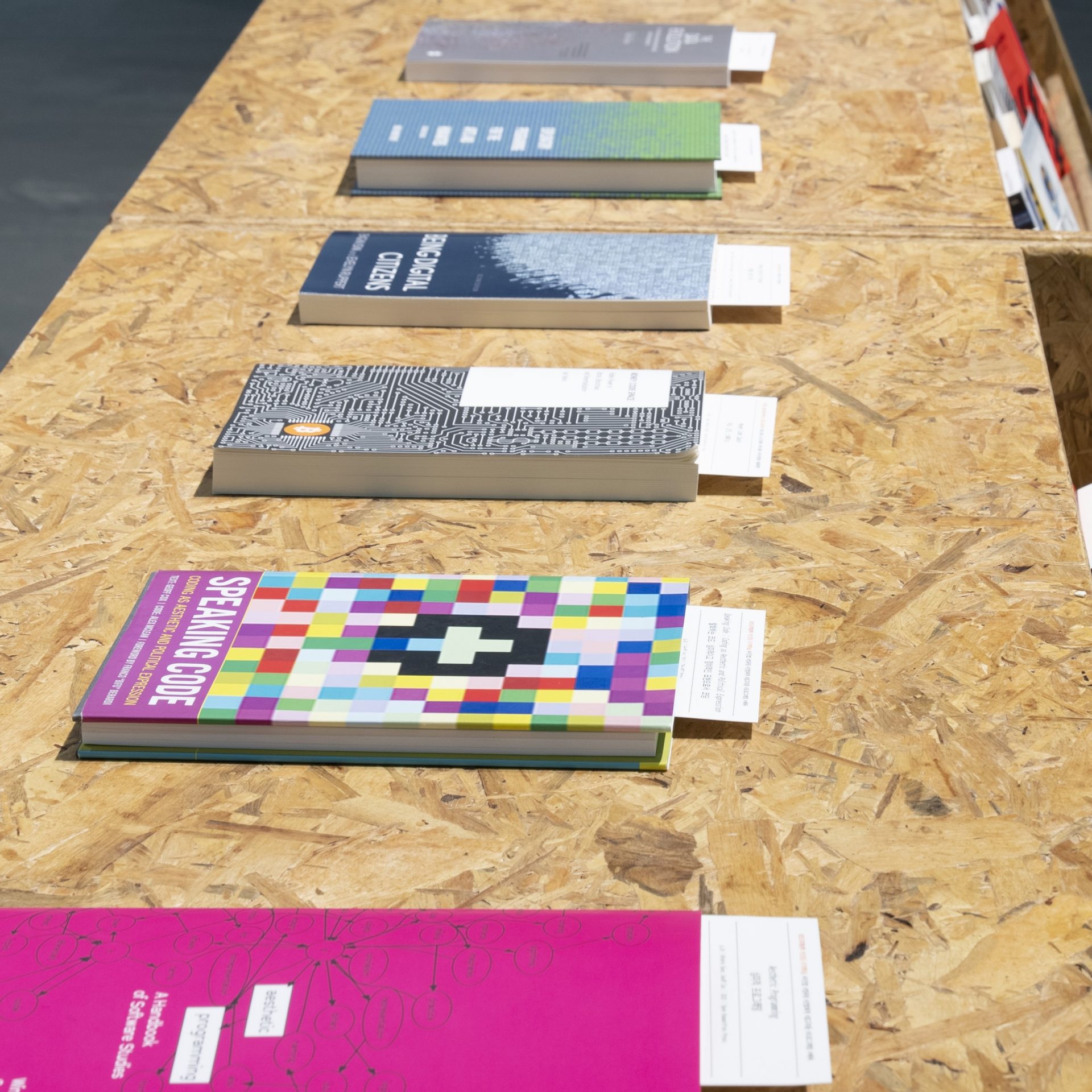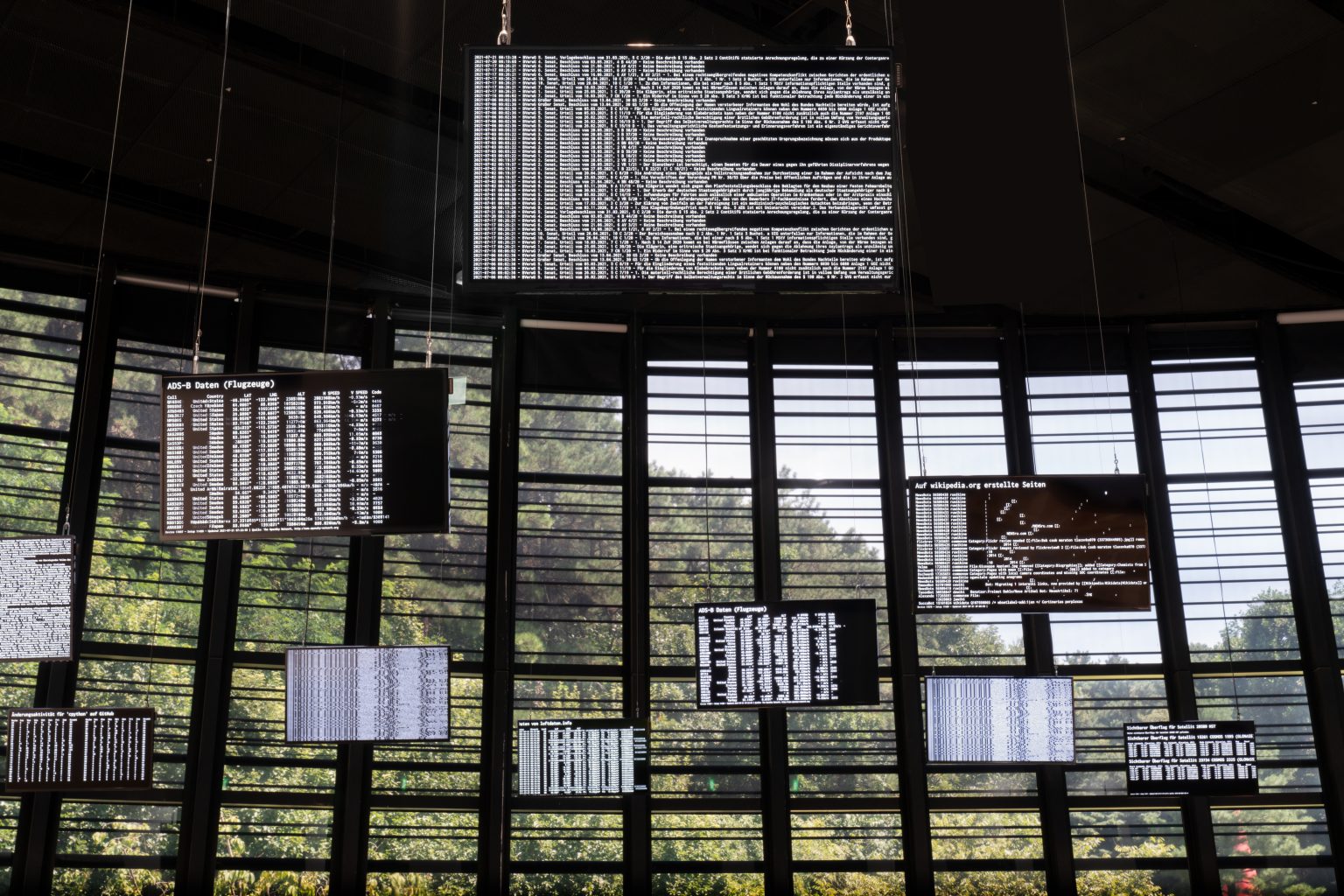About 60 books on the genealogy of digital codes and computing technology are always on the shelves inside the exhibition hall of Open Codes. Networked Commons. Also, Bookmarks are put in the pages of each book that artists and curators referenced when planning the exhibition. Visitors can freely read books in the exhibition hall and refer to bookmarks to understand the exhibition.
Book List
Korean Edition
Against Techno-Fetishism (Kwang-suk Lee, 2020)
Artificial Unintelligence (Meredith Broussard, 2018)
Big Data: A Revolution That Will Transform How We Live, Work and Think (Viktor Mayer-Schönberger, Kenneth Cukier, 2013)
Code: the Hidden Language of Computer HW and SW (Charles Petzold , 2000)
Code for Love (Seoul Express, 2020)
Cybernetics (Norbert Wiener, 1948)
Blockchain Revolution (Don Tapscott and Alex Tapscott, 2018)
Deep Learning (Ian Goodfellow, Yoshua Bengio, and Aaron Courville, 2016)
Form+Code (Casey Reas, Chandler McWiliams, 2010)
How to Speak Machine (John Maeda, 2019)
Introduction to Machine Learning (Ethem Alpaydin, 2014)
Kakao AI Report (Kakao AI report editiors, 2018)
Lifelong Kindergarten (Mitchel Resnick, 2017)
Metadata (Jeffrey Pomerantz, 2015)
Mindstorms (Seymour Papert, 1980)
My Mother Was a Computer (N. Katherine Hayles, 2005)
Platform Capitalism (Nick Srnicek, 2016)
Programming the Universe (Seth Lloyd, 2006)
Rethinking the Datafied Society (Kwang-Suk Lee, 2017)
Software Takes Command (Lev manovich, 2013)
The Black Box Society (Frank Pasquale, 2016)
The Information (James Gleick, 2011)
The Master Algorithm (Pedro Domingos, 2015)
The Society of Mind (Marvin Minsky, 1988)
The World that Computer Science Opens Up (Kwangkeun Yi. 2017)
What Algorithms Want (Ed Finn, 2017)
English Edition
A Hacker Manifesto (McKenzie Wark, 2004)
Aesthetics of the Commons (Cornelia Sollfrank, Felix Stalder, Shusha Niederberger, 2021)
Aesthetic Programming (Winnie Soon, Geoff Cox, 2020)
Algorithms of Oppression: How Search Engines Reinforce Racism (Safiya Umoja Noble, 2018)
Artificial Intelligence: A Guide for Thinking Humans (Melanie Mitchell, 2019)
Artists Re:thinking the Blockchain (Ruth Catlow, Marc Garrett, Nathan Jones, Sam Skinner, 2018)
Being Digital Citizens (Wngin Isin and Evelyn Ruppert, 2015)
Black Code (Ronaled J. Deibert, 2013)
Blockchain (Melanie Swan, 2015)
Bitcoin: The future of Money (Dominic Frisby, 2014)
Code as Creative Medium (Golan Levin, Tega Brain, 2021)
Code/Space (Rob Kitchin, Martin Dodge , 2014)
Coding Freedom (E. Gabriella Coleman. 2012)
Coding Literacy (Annette Vee, 2017)
Critical Code Studies (Mark C. Marino, 2020)
Cutting Code: Software and Sociality (Adrian Mackenzie, 2006)
Data Feminism (Catherine D’Ignazio, Lauren F. Klein, 2020)
Darwin among the Machines (George Dyson, 2012)
Digital Contagions (Jussi Parikka, 2016)
Exploratory Programming For the Arts and Humanities (Nick Montfort, 2016)
Geek Sublime: The Beauty of code, the Code of Beauty (Vikram Chandra, 2014)
How to be a Geek: Essays on the Culture of Software (Matthew Fuller, 2017)
Life on the Screen (Sherry Turkle, 1997)
Machine Learners (Adrian Mackenzie, 2017)
Money Code Space (Jack Parkin. 2020)
Perceptrons (Marvin L. Minsky, Seymour A. Papert, 1969)
Race After Technology (Ruha Benjamin, 2019)
Software Infrastructure Labor (Ned Rossiter, 2016)
Surveillance Capitalism (Shoshana Zuboff, 2019)
Speaking Code : coding as aesthetic and political expression (Geoff Cox, 2013)
Switching Codes (Thomas Bartscherer and Roderick Coover, 2011)
The Charisma Machine (Morgan G. Ames, 2019)
New Dark Age (James Bridle, 2018)
The Data Revolution (Rob Kitchin, 2014)
The Intelligent Web (Gautam Shroff, 2013)
The Silent Intelligence (Daniel Kellmereit and Daniel Obodovski, 2013)
The Stack (Benjamin H. Bratton, 2016)
The Quantified Self (Deborah Lupton, 2016)
We Are Data (John Cheny-Lippold, 2017)
10 PRINT (Nick Montfort et al, 2012)






